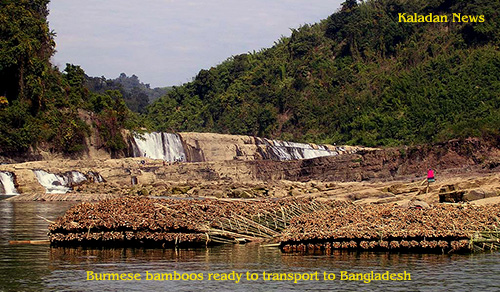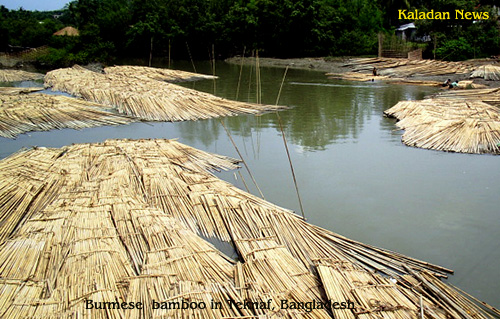Bamboo smuggling to Bangladesh has caused bamboo to be scarce in northern Arakan State for the Rohingya community, said a local elder in Maungdaw...
Teknaf, Bangladesh: Bamboo smuggling to Bangladesh has caused bamboo to be scarce in northern Arakan State for the Rohingya community, said a local elder in Maungdaw.
 “The agents or smugglers of Burma’s bamboo are getting more profit from Burmese bamboo in Bangladesh. The agents organize officers of Burma’s border security force, or Nasaka, to open the routes to transfer the bamboo from northern Arakan State, Burma, to Teknaf, Bangladesh, by sharing the profits.”
“The agents or smugglers of Burma’s bamboo are getting more profit from Burmese bamboo in Bangladesh. The agents organize officers of Burma’s border security force, or Nasaka, to open the routes to transfer the bamboo from northern Arakan State, Burma, to Teknaf, Bangladesh, by sharing the profits.”
“The Burmese authorities have created agent systems in northern Arakan where the authorities get more money from agents, but the locals face more trouble in their daily lives.”
“Most of the Burmese bamboo comes from the Pruma stream of Ngakura, Maungdaw jetty, and Akyab. From Pruma, it comes from the mountains directly, whereas Buthidaung’s bamboo comes by trucks to the Maungdaw jetty. From Akyab, it comes by boat.”
The agents transport the bamboo from Maungdaw with the help of Nasaka personnel in areas where the locals are not able to use bamboo because the prices have increased. The price of one piece of bamboo in Maungdaw is now 700–1000 kyats, when last year it sold for only 500 kyats, said a bamboo trader from Maungdaw.
 “The poor locals are not able to use the bamboo for their household needs and can find only a little bamboo in the market.”
“The poor locals are not able to use the bamboo for their household needs and can find only a little bamboo in the market.”
Along the Burma-Bangladesh border, there is a group of syndicates in Bangladesh who are connected with Burmese bamboo agents. They control the Burmese bamboo and palm leaves, according to Mamon, a bamboo trader in Teknaf.
Syndicates of Bangladesh are selling the bamboo for high prices. 100 pieces of Burmese bamboo are being sold for 2,600 to 3,000 taka along the border. In the recent past, 100 pieces of bamboo were sold for 1,200 to 1,400 at the border, he added. “The Burmese bamboo is not brought through the land port of Teknaf.”
A local from Teknaf said, “We have never seen the price of bamboo along the border be so high.”


